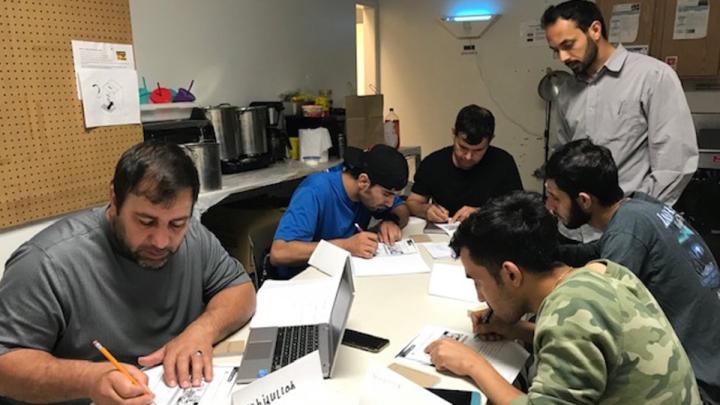
International TESOL program meets refugees and immigrants where they are in the community
Four men from Afghanistan sit around a table in the middle of a chocolate factory lunchroom on Emerson Street in Rochester.
They are learning to speak English by looking at pictures, and repeating the name, of body parts. Eyes. Arms. Feet. In recent months, they’ve practiced how to say days of the week, birthdays and phone numbers.
One of the men uses a complete, grammatically correct sentence to announce, “I hear with my ears.”
 Hairong Shang-Butler jumps up and down in her seat and claps her hands, exclaiming, “Yes! Very good!”
Hairong Shang-Butler jumps up and down in her seat and claps her hands, exclaiming, “Yes! Very good!”
Shang-Butler directs the international Teaching English to Speakers of Other Languages (TESOL) program at the Warner School of Education and Human Development, which has partnered with Rochester Refugee Resettlement Services (RRRS) to teach English to Afghan refugees.
The course, offered in 2022, is formally titled "Employment and Career Advancement Equity: Highly Flexible English Language Program for Immigrants and Refugees." Classes take place at Vigneri Chocolate, owned by second-generation Italian immigrants who offer jobs to refugees associated with the non-profit RRRS.
The four men, who now know how to name major body parts from head to toe, will start their work shifts at the factory — making a wide variety of chocolate candies in different shapes — after a few more vocabulary lessons. They’re in the first of two groups from Afghanistan who will participate in hour-long sessions today. The second group, comprised mostly of women, will filter in when their work shift is over.
“English is a key driver for refugees and immigrants in this country,” Shang-Butler says later. “It’s the gatekeeper to education, to employment, to health, to social connections…almost everything. I firmly believe that English education for them is a human rights issue.”
Shang-Butler, an associate professor of teaching and curriculum, is an immigrant herself. Born in Hubei, China, she came to the United States 12 years ago for her doctoral studies at the University of Rochester. Her plan was to get “systematically trained” in English and return to China to teach English as a foreign language. But once she became involved in projects supporting refugee and new immigrant students, she decided to stay.
“I know the anxiety, the struggles,” she says, adding that her own history makes it easier for those she works with to trust and open up to her.
A few weeks ago, when teaching the words “boy” and “girl” to each group, she opened her wallet and held up pictures of her two sons.
“I can contribute in a unique way,” she says. “For adult language learners, you can't just teach them about the weather. You have to teach from shared experiences, and they will be engaged. If the relationship is not there, learning does not become effective.”
Warner offers several courses to refugees and immigrants. The school cultivated several collaborative partnerships to offer this one, a combination of in-person teaching and online tutoring that began in April 2022. For example, in addition to help from past and present students, it benefits from a cultural ambassador from Afghanistan, provided through RRRS. It also works with Action for a Better Community, which received a grant both to teach English to and purchase a Chromebook for each participant.
Deciding to hold the course at Vigneri Chocolate instead of a Warner School classroom was purposeful.
“Instead of asking them to come to our place to study, we thought, ‘Maybe we can go to their place and meet them where they are,’” says Shang-Butler. “One of our missions is to be an agent of change.”
School-age children who don’t speak English have more opportunities to learn the language, she says. Adults rarely get those chances, which makes them “culturally isolated” and continues the pattern of historic marginalization—especially for those who have been traumatized.
“People say this is just about language, but it’s not,” Shang-Butler says. “We at Warner define this much more broadly. For anyone to be able to understand what's going on in the community, we have to be able to communicate. And we do that by speaking a common language. There are so many issues involved, but those struggles aren't visible to people.”
This is why Shang-Butler is very careful about the volunteers she selects to work with the program. Not only do they need to be passionate, but empathetic.
Two of those volunteers are teaching & curriculum PhD student Keirah Comstock (pictured above) and Yanping Xu '21W (MS), a native of Fuzhou, China, and a former student of Shang-Butler’s in the international TESOL program.
Warner’s partnership with the community, Xu says, is an essential first step in helping refugees truly start a new life. After overcoming the language barrier, they can earn a fair wage and become less lonely and disoriented in their new socio-cultural environment, which reduces psychological stress. More importantly, she says, because social psychology research shows that individual differences between people often are more significant than socio-cultural differences, a common language allows more people to understand, care about and build connections with them.
From one end of the lunchroom table, Xu points to a bag of coffee beans.
“We’re going to learn about our five senses,” she announces.
Xu takes a bean out of the bag and tells the group to look it over. She shakes the bag so they can hear the other beans. She has the men pass around the single bean so they can smell and touch it.
“I use my hand to touch a coffee bean,” she says, emphasizing the words “hand” and “touch.”
As for taste, Xu is stumped.
“Next time, we should try this with chocolate,” she says.